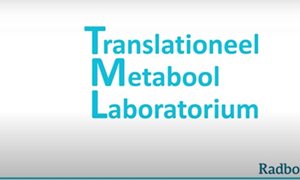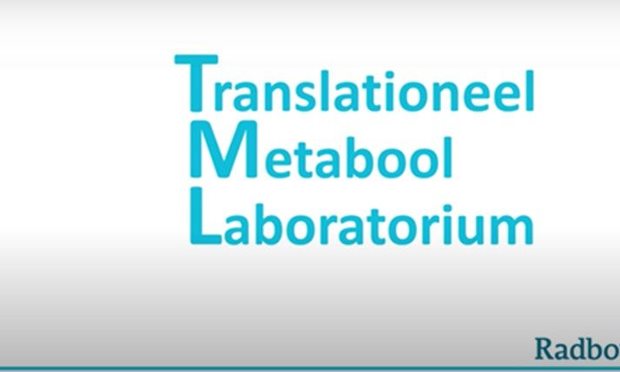

About our laboratory
The Translational Metabolic Laboratory (TML) is part of the department of Laboratory Medicine. TML specializes in clinical diagnostics and research of (genetic) metabolic disorders.Diagnostics and research on international top level
We specialize in research and diagnostics for genetic metabolic disorders, disorders in iron homeostasis, neurochemistry and pediatric nephrology. Our research and diagnostic applications are internationally renowned. More information about our diagnostics is given below.Request forms and protocols
Request forms
- Lysosomal Storage Disorders (LSD)
- Congenital Disorders of Glycosylation (CDG)
- Functional Genomics
- Mitochondrial Diagnostics Biochemistry & Genetics
- Diagnostics of complement mediated disorders (CMD)
- Metabolite diagnostics
- Malodour syndrome
Protocols metabolic disorder
- Sending fresh muscle biopsy
- Skin biopsy samples and cultured fibroblasts
- Sending frozen muscle biopsy
- Sending chorionic villi
- Sending molecular genetic diagnostics
RvA Accreditation ISO 15189
Our diagnostics
Lysosomal Storage Diseases (LSD)
Lysosomal storage diseases are a subgroup op metabolic disorders, caused by a problem in the breakdown of specific classes of macromolecuels in the lysosome. read moreLysosomal Storage Diseases (LSD)
Lysosomal storage diseases are a subgroup op metabolic disorders, caused by a problem in the breakdown of specific classes of macromolecuels in the lysosome. We offer both lysosomal enzyme diagnostics and lysosomal metabolite diagnostics to analyse the accumulating metabolites in body fluids.
Congenital Disorders of Glycosylation
Genetic glycosylation disorders comprise a highly heterogeneous group of metabolic disorders affecting the glycosylation of proteins and lipids. read moreMitochondrial disorders
TML offers a complete range of diagnostic genetic and biochemical laboratory tests for mitochondrial disorders. read moreMitochondrial disorders
Since 1975, our laboratory is the national reference laboratory for the diagnostics of mitochondrial disorders. The knowledge and expertise that we obtain from the scientific research of mitochondrial function in health and disease is applied to the development of state-of-the-art diagnostic laboratory tests. For this purpose, we work closely together with the metabolic pediatricians, neurologists and clinical geneticists in our center, as well as with the diagnostic laboratories of the departments of Genetics and Pathology, and with the research laboratories of the Radboud Center for Mitochondrial Medicine. In addition, we collaborate with various other mitochondrial centers abroad.
Our lab offers diagnostic tests ranging from the biochemical examination of muscle biopsies and cultured skin fibroblasts (this includes amongst others enzyme measurements of the respiratory chain enzymes, complex V, PDH, and PC, measurement of coenzyme Q10, ATP production, and respiration) to genetic tests such as exome sequencing and mtDNA sequencing. We are specialized in performing various laboratory functional tests to validate genetic variant of unknown clinical significance (VUS).
Neurochemistry
Our Neurochemistry Laboratory is part of the Translational Metabolic Laboratory, Department of Laboratory Medicine of the Radboud University Nijmegen Medical Centre, the Netherlands. read moreNeurochemistry
Our Neurochemistry Laboratory is part of the Translational Metabolic Laboratory, Department of Laboratory Medicine of the Radboud University Nijmegen Medical Centre, the Netherlands.
The Neurochemistry Laboratory is the National Reference Laboratory for Neurochemical analysis of Cerebrospinal Fluid in the Netherlands. We offer a wide range of specialty neurochemical analyses (in cerebrospinal fluid, urine or blood) for the diagnosis of neurological infectious, inflammatory and auto-immune disorders, for neurodegenerative disorders (dementia s and movement disorders), for neurometabolic disorders, and for poly(radiculo) neuropathies.
Contact:
Dr. Marcel Verbeek marcel.verbeek@radboudumc.nl
Telefoon +31 (0) 24 36 14567
Metabolite diagnostics inborn errors of metabolism
In the Translational Metabolic Laboratory, we offer several metabolite analyses in blood, urine and CSF in order to detect abnormalities in these body fluids.
read moreMetabolite diagnostics inborn errors of metabolism
In the Translational Metabolic Laboratory, we offer several metabolite analyses in blood, urine and CSF in order to detect abnormalities in these body fluids. Abnormal concentrations of metabolites or abnormal metabolites in these body fluids may indicate the presence of an inborn error of metabolism. Once a diagnosis has been established, it may lead to initiation of treatment. The efficacy of treatment may be followed by additional targeted laboratory measurements of the abnormal metabolites
A metabolic ‘basic screening’ in blood and urine comprises at least the analyses of amino acids, organic acids and carnitine-esters, apart from a semi-quantitative urine stick test, including pH, nitrite, ketones and glucose. On the basis of the clinical indication that needs to be provided, additional metabolite analyses may be indicated and performed, including e.g. oligosaccharides, mucopolysaccharides, purines&pyrimidines, very long-chain fatty acids, cholesterol biosynthesis, creatine/guanidinoacetate, methylmalonic acid, total homocysteine or monosaccharides and polyols. It is therefore essential that all clinical symptoms are indicated on the metabolic request form, which will lead to a personalized metabolic screening.
Turnaround time metabolite screening:
Usually, a report is sent within 4-6 weeks after receipt of the samples. This report contains the results of all metabolite tests performed, including appropriate reference ranges for quantitative assays, as well as an interpretation of the results and suggestions for follow-up diagnostics (if necessary). The latter may include a request for repeated samples, or proposal for additional enzyme or DNA diagnostics to confirm a specific diagnosis. If the clinical situation of the patient necessitates urgent metabolic diagnostics or if interim results are required please contact the laboratory.
How to send samples:
For a complete metabolic screening it is important to send both blood and urine, preferably collected at the same time from a clinical crisis situation, together with our request form with detailed full clinical information on the patient to enable personalized metabolic screening. Occasionally,(e.g. convulsions) a CSF sample is necessary for adequate diagnostics. Generally, we would like to receive 1-2 mL heparin plasma and 10-20 mL of urine. A 24h urine sample is not required for most analyses and will be asked for by the laboratory if necessary. Urine, plasma and/or CSF samples should be sent frozen to our laboratory at the following address:
Radboud University Nijmegen Medical Center
Laboratory for Diagnostics
PO Box 9101
Internal post 815
6500 HB Nijmegen
The Netherlands
Contact us:
For questions related to metabolic screening in urine and/or blood, or if the clinical situation of a patient necessitates urgent metabolic diagnostics please contact the laboratory:
Phone: +31-24-3614567
E-mail: basisdiagnostiek-TML.labgk@radboudumc.nl
Complement-mediated disorders
We perform specialized diagnostics for complement-mediated disorders with a genetic cause, a.o. atypical hemolytic uremic syndrome, C3 glomerulonephritis, dense deposit disear and age-related macula degeneration. read moreComplement-mediated disorders
The complement system is a part of the innate immune system. It can be activated by various triggers, such as antibody-antigen complexes, carbohydrates on bacterial surfaces, and cell debris. The complement acts via multiple defense mechanisms: release of anaphylatoxins (C3a and C5a) that are responsible for activation and recruitment of leucocytes to the site of infection, facilitation of phagocytosis, and lysis of pathogens by the terminal complement complex (TCC). Healthy human cells are protected from complement attack by complement regulators in the circulation and on cells surfaces.
Genetic aberrations and autoantibodies can lead to excessive or diminished complement activity.
Excessive complement activity can lead to damaging of healthy human cells, whereas diminished complement activity can lead to decreased protection against infections.
We provide comprehensive insight into the activation/regulation of the complement system in the patient by:
• Measuring concentrations of complement proteins
• Measuring concentrations of complement activation biomarkers
• Detecting autoantibodies to complement components
• Analyzing the function of complement proteins
• Sequencing of complement genes
For patients that undergo eculizumab treatment, we offer assays to measure eculizumab concentration and complement inhibiting capacity.
For a full spectrum of disorders and methods, please see our request form: English / Dutch.
For more information please contact:
Dr. Marloes Michels Marloes.Michels@radboudumc.nl Tel. +31 (0) 6 50190038
Dr. Jolein Gloerich Jolein.Gloerich@radboudumc.nl Tel. +31 (0) 6 31117558
Prof. dr. Bert van den Heuvel Bert.vandenHeuvel@radboudumc.nl Tel. +31 (0) 24 3614567
General information

Our partners
Laboratory specialists, medical specialists, biochemists, technicians, PhD students, postdocs and students work jointly to create personalized diagnostics in TML.
read moreOur partners
Laboratory specialists, medical specialists, biochemists, technicians, PhD students, postdocs and students work jointly to create personalized diagnostics in TML.
TML is a strategic collaboration between the Radboudumc Departments of Pediatrics and Neurology and the Clinical Genetics Center Nijmegen Foundation. TML is part of the Department of Genetics and there is intensive collaboration with the MUMC+. Our MS activities are part of the Radboudumc Technology Center Mass Spectrometry. As translational laboratory we collaborate with several scientists in the Radboudumc on project aiming to have an impact in personalized healthcare.
Our external partnernetwork is focused on rare metabolic disorders, via (inter)national collaborations such as clinical expertise centers, European Reference Networks, Erfelijke Stofwisselingsziekten Nederland, and United for Metabolic Disease. Futhermore, we collaborate with external partners focused on technologies (Dutch Techcenter for Life Sciences, Netherlands Metabolomics Centre, Netherlands X-omics Initiative) and translational medicine (EATRIS, Health-RI).
Our education
TML is active in schooling and education of students in different fields of study. read moreOur education
High quality education on metabolic disorders is essential for clinicians, technicians and researches in the life sciences. TML has an active role in the bachelor programs of Medicine, Biomedical Sciences, Molecular life sciences and the master program Molecular Mechanisms of Disease.
Internships
We offer the opportunity to follow an internship at our laboratory. If you are interested in a research topic or technique, feel free to ask our staff for options. Also, our open internship options are published via the Radboud Health Academy.
Our research
The scientific research of TML is part of the following Radboudumc research themes:- Alzheimer disease
- Cancer Development
- Disorders of movement
- Mitochondrial diseases
- Renal disorders
Our organizational network
The Translational Metabolic Laboratory (TML) is an organizational network of ambitious professionals working together on solutions for scientific and clinical needs. read moreOur organizational network
The Translational Metabolic Laboratory (TML) is an organizational network of ambitious professionals working together on solutions for scientific and clinical needs. They translate these needs into diagnostic applications, novel therapies and patient monitoring.
We are internationally renowned for the application of different OMICS technologies in a clinical diagnostic setting
Feedback
Our organization appreciates your feedback. It enables us to improve ourselves. In case you are dissatisfied with any aspect of our services, please contact us to find a solution together.
- (024) 361 45 67
- secretariaat-TML.labgk@radboudumc.nl
